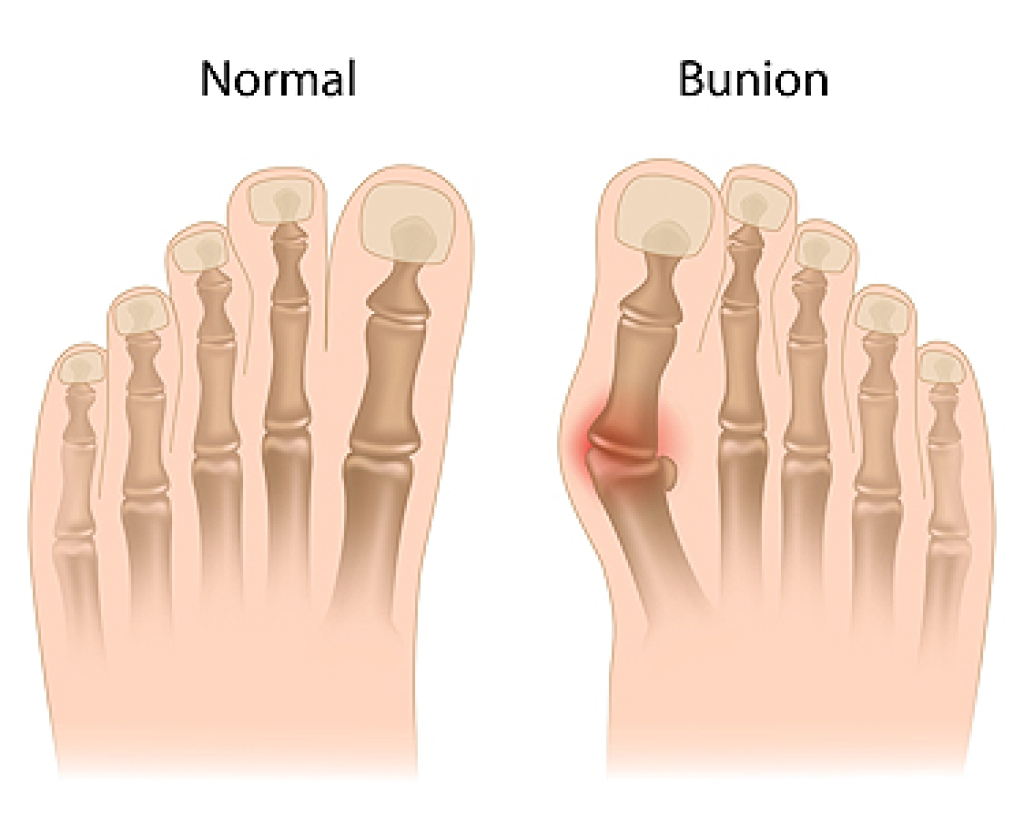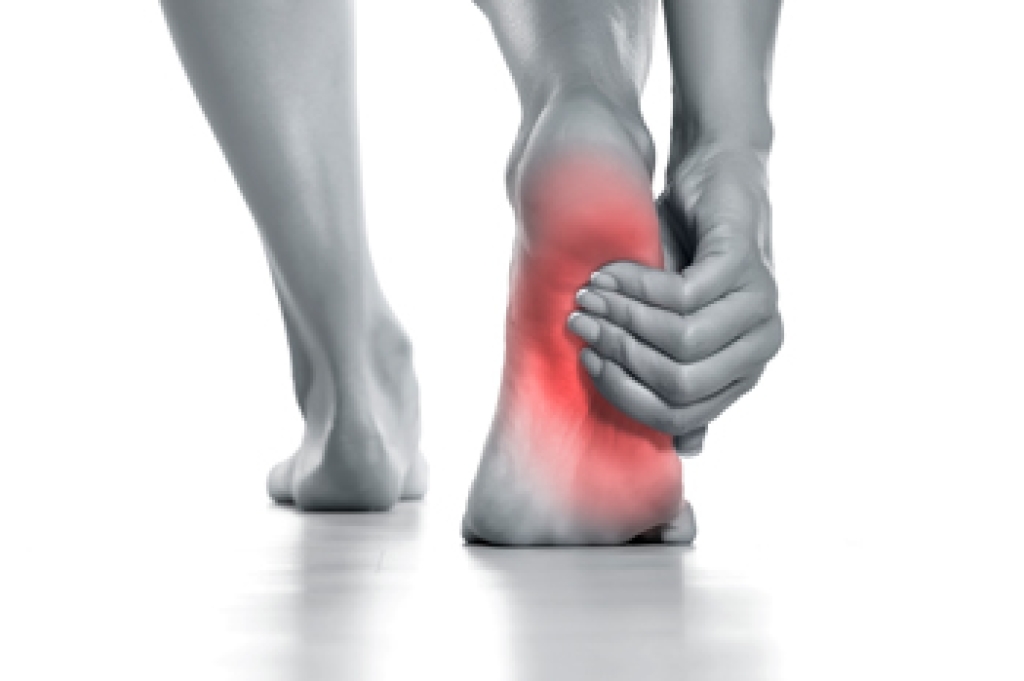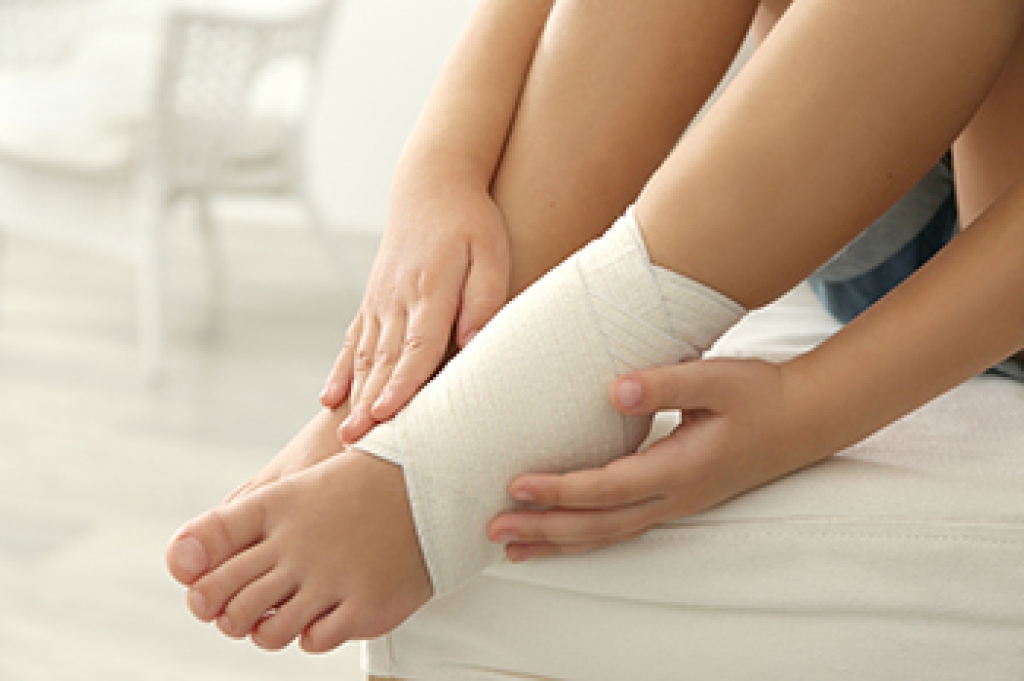Blog
Causes and Treatment of Bunions

A bunion, medically known as hallux valgus, is a bony prominence that forms at the base of the big toe when the top of the toe shifts inward toward the others. This misalignment can lead to pain, swelling, redness, and difficulty wearing certain shoes. As a bunion progresses, the joint may become stiff, making simple movement uncomfortable. Some people also develop corns or calluses due to increased friction on the affected area. Contributing factors to bunion formation include inherited foot structure, flat feet, joint conditions such as rheumatoid arthritis, and aging. Although wearing tight or high-heeled shoes do not directly cause bunions, they can place additional stress on the foot, worsening symptoms. A podiatrist can assess the severity of a bunion and offer treatment to relieve pain and improve foot function. Options include padding, custom orthotics, or footwear modifications. In cases where pain is persistent or mobility is limited, surgery may be necessary to realign the toe. If you have a bunion that is interfering with daily activities, it is suggested that you schedule an appointment with a podiatrist for an exam, diagnosis, and treatment options, which may include surgery.
If you are suffering from bunion pain, contact one of our podiatrists of Carolina Foot & Ankle Specialists. Our doctors can provide the care you need to keep you pain-free and on your feet.
What Is a Bunion?
Bunions are painful bony bumps that usually develop on the inside of the foot at the joint of the big toe. As the deformity increases over time, it may become painful to walk and wear shoes. Women are more likely to exacerbate existing bunions since they often wear tight, narrow shoes that shift their toes together. Bunion pain can be relieved by wearing wider shoes with enough room for the toes.
Causes
- Genetics – some people inherit feet that are more prone to bunion development
- Inflammatory Conditions - rheumatoid arthritis and polio may cause bunion development
Symptoms
- Redness and inflammation
- Pain and tenderness
- Callus or corns on the bump
- Restricted motion in the big toe
In order to diagnose your bunion, your podiatrist may ask about your medical history, symptoms, and general health. Your doctor might also order an x-ray to take a closer look at your feet. Nonsurgical treatment options include orthotics, padding, icing, changes in footwear, and medication. If nonsurgical treatments don’t alleviate your bunion pain, surgery may be necessary.
If you have any questions, please feel free to contact our offices located in Mount Pleasant and Charleston, SC . We offer the newest diagnostic and treatment technologies for all your foot care needs.
Relieving Tired and Achy Feet for Better Comfort

Feet endure constant pressure throughout the day, leading to soreness and fatigue. Wearing the right shoes with proper support and cushioning helps reduce strain and prevents discomfort. Shoes that fit well and provide arch support can make a significant difference in foot health. Walking barefoot on hard surfaces can increase stress on the feet, so wearing supportive footwear indoors can help maintain comfort. Stretching regularly keeps the muscles flexible and reduces tension, especially after long periods of standing or walking. Foot exercises, such as toe curls and ankle rotations, strengthen the muscles and improve circulation. If your feet are frequently fatigued, it is suggested that you consult a podiatrist who can offer you additional effective methods to relieve tired feet.
Foot Pain
Foot pain can be extremely painful and debilitating. If you have a foot pain, consult with one of our podiatrists from Carolina Foot & Ankle Specialists. Our doctors will assess your condition and provide you with quality foot and ankle treatment.
Causes
Foot pain is a very broad condition that could be caused by one or more ailments. The most common include:
- Bunions
- Hammertoes
- Plantar Fasciitis
- Bone Spurs
- Corns
- Tarsal Tunnel Syndrome
- Ingrown Toenails
- Arthritis (such as Gout, Rheumatoid, and Osteoarthritis)
- Flat Feet
- Injury (from stress fractures, broken toe, foot, ankle, Achilles tendon ruptures, and sprains)
- And more
Diagnosis
To figure out the cause of foot pain, podiatrists utilize several different methods. This can range from simple visual inspections and sensation tests to X-rays and MRI scans. Prior medical history, family medical history, and any recent physical traumatic events will all be taken into consideration for a proper diagnosis.
Treatment
Treatment depends upon the cause of the foot pain. Whether it is resting, staying off the foot, or having surgery; podiatrists have a number of treatment options available for foot pain.
If you have any questions, please feel free to contact our offices located in Mount Pleasant and Charleston, SC . We offer the newest diagnostic and treatment technologies for all your foot care needs.
Pickleball and Ankle Fractures

Ankle fractures are a growing concern in pickleball, particularly among older women. Post-menopausal players are at greater risk due to reduced bone density, making bones more susceptible to breaks. These injuries often occur during falls when a player slides or dives for the ball but miscalculates their landing, leading to a painful twist or impact. An ankle fracture involves a break in one or more of the bones in the ankle joint, causing swelling, bruising, and difficulty bearing weight. Preventing such injuries starts with wearing sturdy, supportive shoes designed for court sports and improving balance and agility through regular exercise. Playing on well-maintained surfaces and practicing controlled movements also help reduce risks. If you have broken your ankle while playing pickleball, it is suggested that you visit a podiatrist for appropriate treatment.
Broken ankles need immediate treatment. If you are seeking treatment, contact one of our podiatrists from Carolina Foot & Ankle Specialists. Our doctors can provide the care you need to keep you pain-free and on your feet.
Broken Ankles
A broken ankle is experienced when a person fractures their tibia or fibula in the lower leg and ankle area. Both of these bones are attached at the bottom of the leg and combine to form what we know to be our ankle.
When a physician is referring to a break of the ankle, he or she is usually referring to a break in the area where the tibia and fibula are joined to create our ankle joint. Ankles are more prone to fractures because the ankle is an area that suffers a lot of pressure and stress. There are some obvious signs when a person experiences a fractured ankle, and the following symptoms may be present.
Symptoms of a Fractured Ankle
- Excessive pain when the area is touched or when any pressure is placed on the ankle
- Swelling around the area
- Bruising of the area
- Area appears to be deformed
If you suspect an ankle fracture, it is recommended to seek treatment as soon as possible. The sooner you have your podiatrist diagnose the fracture, the quicker you’ll be on the way towards recovery.
If you have any questions, please feel free to contact our offices located in Mount Pleasant and Charleston, SC . We offer the newest diagnostic and treatment technologies for all your foot care needs.
Function and Injuries of the Ankle Joint

The ankle joint is a hinge joint connecting the lower leg to the foot, allowing movement for walking, running, and stability. It is supported by ligaments, tendons, and muscles that help maintain balance and absorb impact. Ankle sprains are the most common injury, occurring when ligaments stretch or tear. There are three types of ankle sprains which are lateral, medial, and high ankle sprains. Lateral sprains happen when the foot rolls outward, stretching the outer ligaments. Medial sprains are less frequent and occur when the foot rolls inward, straining the inner ligaments. High ankle sprains involve injury to ligaments above the ankle, often from twisting motions. Relief includes rest, compression, elevation, bracing, and targeted exercises. Severe cases may require immobilization or surgery. If you have sprained your ankle, it is suggested that you consult a podiatrist who can diagnose the severity and recommend appropriate care for proper healing and prevention.
Although ankle sprains are common, they aren’t always minor injuries. If you need your ankle injury looked at, contact one of our podiatrists from Carolina Foot & Ankle Specialists. Our doctors can provide the care you need to keep you pain-free and on your feet.
How Does an Ankle Sprain Occur?
Ankle sprains are the result of a tear in the ligaments within the ankle. These injuries may happen when you make a rapid shifting movement while your foot is planted. A less common way to sprain your ankle is when your ankle rolls inward while your foot turns outward.
What Are the Symptoms?
- Pain at the sight of the tear
- Bruising/Swelling
- Ankle area is tender to touch
- In severe cases, may hear/feel something tear
- Skin discoloration
Preventing a Sprain
- Wearing appropriate shoes for the occasion
- Stretching before exercises and sports
- Knowing your limits
Treatment of a Sprain
In many cases, the RICE method (Rest, Ice, Compression, and Elevate) is used to treat ankle sprains. However, you should see a podiatrist to see which treatment option would work best with your injury. In severe cases, surgery may be required.
It is important to ask your doctor about rehab options after you receive treatment for your injury. Stretching, strength training, and balance exercises may help the ankle heal while also preventing further injury.
If you have any questions, please feel free to contact our offices located in Mount Pleasant and Charleston, SC . We offer the newest diagnostic and treatment technologies for all your foot care needs.



